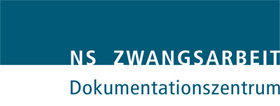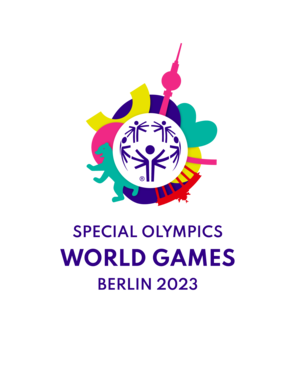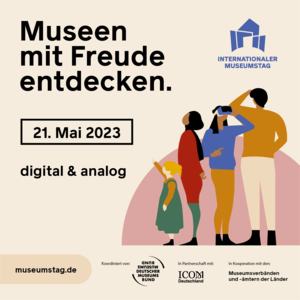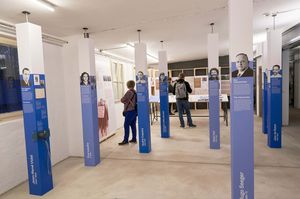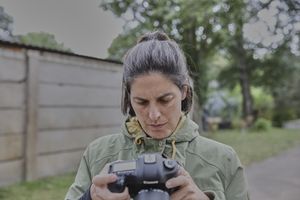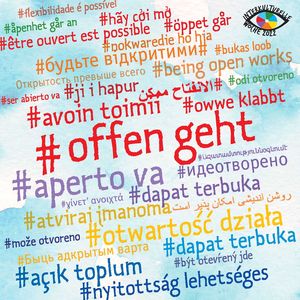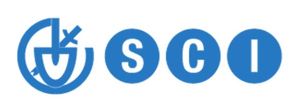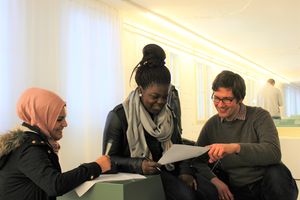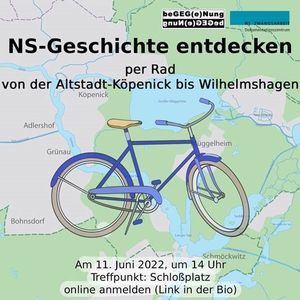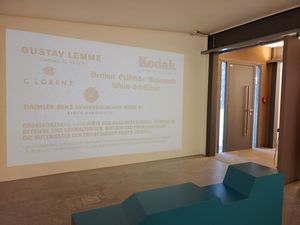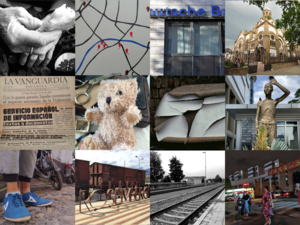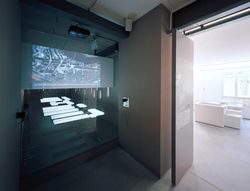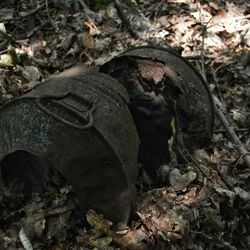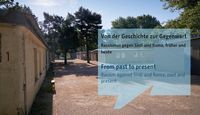2023
Special Olympics World Games 2023
11th - 25th June 2023
Free guided tours in simple English
Health, Sickness and Murder of Forced Labourers
Guided Tour in Simple English (2h)
During the Second World War, millions of people were deported to Germany for forced labour. Sick forced labourers were taken to collective camps, where many died. Forced labourers who were classified as unfit for work were systematically murdered.
- Saturday, 10th June 1 pm
- Thursday, 15th June 4 pm
- Saturday, 24th June 1 pm
Football and Nazi Forced Labour
Guided Tour in Simple English (2h)
Football was an important leisure activity and distraction for many male forced labourers during the Second World War. This was also the case in Berlin. However, people from Eastern Europe were forbidden to play. The tour provides insights into the racist system of Nazi forced labour.
- Saturday, 17th June 1 pm
- Friday, 23rd June 3 pm
We'll be happy to offer free guided tours for blind and visually impaired guests, please get in touch with us
International Museum's Day
Sunday, 21 May 2023
11 am | Tour: Everyday Life of Forced Laborers in National Socialism (ENGLISH)
The tour through the former Nazi forced labor camp and the permanent exhibition "Forced Labour in the Daily Round 1938-1945" gives an overview of forced labor in National Socialism. Who were the 13 million men, women and children who were forced to work in the German Reich? What work did they have to do? How were they treated? A visit to the restored "Barrack 13" gives an impression of how the forced laborers lived. It emerges that forced laborers were part of the everyday life of Germans.
13 Uhr | Führung: "Vergessen und Vorbei? Das Lager Lichterfelde und die französischen Kriegsgefangenen"
In der Führung geht es um die wechselvolle Geschichte des ehemaligen Kriegsgefangenenlagers Lichterfelde. Verschiedene Dimensionen wie die Struktur des Berliner Kriegsgefangenensystems, Zwangsarbeit oder verbotene Beziehungen werden vorgestellt und besprochen.
15 Uhr | Führung: "Alltag Zwangsarbeit 1938-1945" und "Baracke 13"
Der Rundgang durch das ehemalige NS-Zwangsarbeitslager gibt einen Überblick über Zwangsarbeit im Nationalsozialismus. Wer waren die 13 Millionen Männer, Frauen und Kinder, die zum Arbeitseinsatz im Deutschen Reich gezwungen wurden? Welche Arbeiten mussten sie verrichten? Wie wurden sie behandelt? Ein Besuch an der restaurierten „Baracke 13“ vermittelt einen Eindruck, wie die Menschen lebten. Dabei wird deutlich, dass Zwangsarbeit zum Alltag der Deutschen gehörten.
Experiences of French prisoners of war in Berlin
Public workshop
25 January 2023 | 4 - 8 pm
The workshop is about the eventful history of the former prisoner of war camp Lichterfelde. Various dimensions such as the structure of the Berlin prisoner of war system, forced labour or forbidden relationships will be explored in depth in small groups.
If required, whispered translations into French or English can be organised.
Registration: weber(at)topographie.de
The workshop is part of the event series "From History to the Present. Places of historical and political education work".
2022
Mark Mühlhaus: Photography Workshop
The workshop invites all those interested to engage photographically with the topic of Nazi forced labour and to learn how to use a digital SLR camera.
The historical site of the Nazi Forced Labour Documentation Centre is the focus of the search for traces. The participants find their own motifs on the grounds of the former accommodation camp for forced labourers and create pictures. The aim is to tell their own story through the examination of content and photography. The photographer Mark Mühlhaus (www.attenzione-photo.com) has dealt intensively with the topic of Nazi commemoration politics. His images have been published, among others, in the illustrated books "Begegnungen" and "KZ Überlebende und die, die nach ihnen kommen" or in photo exhibitions such as "Im Schatten von Auschwitz" (2018/2021).
When:
Friday, 14 October 2022: (Start 13h) - Sunday, 16 October 2022: until 16h
Who: For interested persons aged 18 and over; SLR cameras will be provided if required.
Minimum number of participants: 6, maximum 12 persons
Registration: Eva Kuby: kuby(at)topographie.de
Costs: None
Intercultural Week 2022
For Intercultures Weeks 2022, the Documentation Centre offers free public guided tours in various languages. We look forward to your visit!
Sun, 25.9. 11 a.m. - public guided tour in English
Sun, 25.9. 1 pm - public guided tour in Russian
Sun, 25.9. 3 pm - public guided tour in German
Sat, 1.10. 11 am - public guided tour in Russian
Sat, 1 Oct. 11 am - public IMI tour in Italian
Sat, 1.10. 3 pm - public guided tour in German
Sun, 2.10. 11 am - public guided tour in English
Sun, 2.10. 1 p.m. - public IMI tour in German
Sun, 2.10. 3 p.m. - public guided tour in German
Internationales Study Camp
"Searching for Traces of Forced Labour: eine fotografische Spurensuche"
14 - 27 August 2022
An international study camp in cooperation with Service Civil International. During the project "Searching for Traces of Forced Labour", international participants will go on a photographic search for traces of Nazi forced labour at various stations in Berlin, exploring the impact that the Second World War and Nazi forced labour had on the place. They will be introduced to the basics of photography and accompanied by a professional photographer. The results of the search for traces will be photographs and the stories that go with them. They will be incorporated into an exhibition that will be shown at the Documentation Centre.
International Summer Camp
"A Staged Reading on the Subject of Nazi Forced Labour".
20 - 31 July 2022
The international summer camp takes place in cooperation with Aktion Sühnezeichen Friedensdienste. The project focuses on biographical work and the filming of a staged reading.
During the summer camp, the participants will deal with the backgrounds and life stories of the former forced labourers, as well as those of the camp leaders. By studying the interviews and other sources, the participants will gain an insight into the structures of Nazi forced labour and into individual biographies of former actors. In this way, we want to awaken interest in historical and political processes and show that history and a critical attitude also have something to do with one's own living environment.
In the practical part, the participants will learn the basics of theatre and at the end they will film a staged reading with the interviews of the former forced labourers. The staged work will be complemented by guided tours of the Nazi Forced Labour Documentation Centre and a district walk to historical sites in Berlin.
Team qualification company history
Multi-training
17 - 19 June 2022
Fri: 3.00 - 6.00 p.m.
Sat + Sun: 10.00 a.m. to 4.30 p.m.
Are you a political educator? Do you have experience in the field of extracurricular historical-political education? Then we would like to invite you to the team qualification #Betriebsgeschichte!
What role did individual companies play in the National Socialist camp system? Are forced labourers remembered today in the companies and/or in the industry? If so, how do companies deal with their history?
The three-day training provides basic analyses and insights into debates on the topic of forced labour and National Socialism. In addition, methods and seminar concepts will be tested and discussed in order to work out parts of the history of their own companies and branches with trainees and interested trade union youth.
Gesa Lonnemann (youth education officer Arbeit und Leben Niedersachsen) will present her concept #Betriebsgeschichte using the examples of Rheinmetall AG and Continental AG. Based on this, we will discuss possibilities of applying the concept for the Berlin-Brandenburg region.
The seminar is offered in cooperation with Arbeit und Leben Berlin-Brandenburg and the Nazi Forced Labour Documentation Centre. Registration: Inga Steengrafe steengrafe(at)berlin.arbeitundleben.de 030/ 5130 192 53
Discover NS history
By bike from Köpenick Old Town to Wilhelmshagen
11 June 2022 | 2 p.m. | Meeting point: Schlossplatz Altstadt Köpenick
After almost 80 years, it is easy to overlook the remaining traces of National Socialism in everyday life. That's why we should consciously take the time to discover these traces. In which places in our neighbourhood are there remnants of the Nazi dictatorship, where are there places of remembrance and where are streets named after victims of the Nazis?
On 11 June, together with the Haus der Jugend Köpenick, project beGEG(e)Nung, we invite especially young people to a bicycle tour to visit various stations of Nazi history in the district of Treptow-Köpenick and to deal with their background. On the approximately three-hour tour, everyday places will be looked at in a different way.
Registration online at: https://eveeno.com/625799991
Primarily for youths and young adults between 14 and 27 years of age.
Tour language is German.
RESEARCHING ONE‘S FAMILY HISTORY REGARDING POSSIBLE INVOLVEMENT IN NAZI CRIMES
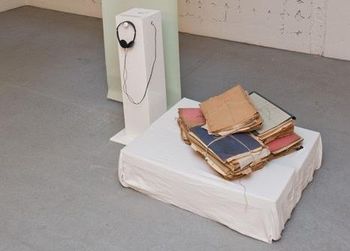
For younger descendants it is often difficult to ask their relatives about their family history during National Socialism: usually they did not get to know their relatives who had lived at that time. Often only fragments about their life stories between 1933 and 1945 are known. In narratives handed down by families the focus is often on the sufferings of relatives who were not persecuted. Nevertheless, family memories and
documents can be an initial starting point for finding out more about the past of one's own family, and thus possible perpetrators and involvement of relatives, be it in the context of Nazi forced labour or other Nazi crimes. The workshop will present research approaches as well as methods for conducting conversations with one's relatives.
The event is co-hosted by Partnerschaft für Demokratie Altglienicke and and funded within the programme "Demokratie leben!" of the BMFSFJ. The workshop is part of a series of events titled „From Past to Present. Revisiting historical and political places in Treptow-Köpenick.“
The series of events is a cooperation project of: aras* - politische Bildung an Schulen, Zentrum für Demokratie Treptow-Köpenick, Partnerschaft für Demokratie Treptow-Köpenick, Partnerschaft für Demokratie Schöneweide, Partnerschaft für Demokratie Altglienicke, Projekt Dialog im Kosmos – aufsuchende politische Bildung im Kosmosviertel in Berlin Altglienicke, InteraXion – Willkommensbüro für geflüchtete Menschen und Migrant*innen, offensiv’91 e.V., TKVA- Treptow-Köpenick für Vielfalt und gegen Antisemitismus (Pad gGmbH), MaMis en Movimiento e.V., Dokumentationszentrum NS-Zwangsarbeit, Museen Treptow-Köpenick, Bezirksamt Treptow-Köpenick
International Week against Racism
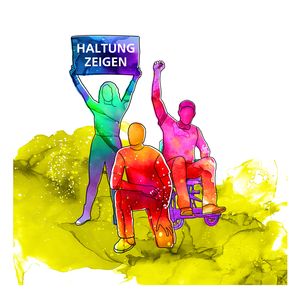
Friday, 18 March | 5:00 - 7:00 pm
Forced labour of Sinti*ze & Rom*nja - public guided tour (German)
This guided tour focuses on the forced labour that Sinti*ze and Rom*nja had to perform, for example, in Berlin factories and the film industry. Selected biographies will be used to illustrate what this meant for those affected. In addition, the significance of racism against Sinti*ze and Rom*nja, dimensions of their persecution and the National Socialist camp system will be discussed.
-------------------------------------------------------------------
Saturday, 19 March | 3:00 - 5:00 pm
Everyday life of forced labourers under National Socialism - public guided tour (German)
The tour of the former Nazi forced labour camp provides an overview of forced labour under National Socialism. Who were the 13 million men, women and children forced into labour in the German Reich? What kind of work did they have to do? How were they treated? A visit to the restored "Barrack 13" gives an impression of how people lived. It becomes clear that forced labour was part of everyday life for Germans.
-------------------------------------------------------------------
Sunday, 20 March
11:00 am - 01:00 pm
Everyday Life of Forced Laborers in National Socialism - guided tour in English
The tour through the former Nazi forced labor camp and the permanent exhibition "Forced Labour in the Daily Round 1938-1945" gives an overview of forced labor in National Socialism. Who were the 13 million men, women and children who were forced to work in the German Reich? What work did they have to do? How were they treated? A visit to the restored "Barrack 13" gives an impression of how the forced laborers lived. It emerges that forced laborers were part of the everyday life of Germans.
1:00 - 3:00 pm
"Between all chairs" Italian military internees as forced labourers - public guided tour (German)
Italian military internees were soldiers who fell into German captivity from 1943 onwards. Italy had terminated its alliance with the German Reich, and the former allies were henceforth considered "traitors". The guided tour through the permanent exhibition "Between All Stools" sheds light on the historical background and shows the conditions under which the approximately 650,000 Italian military internees lived and worked in captivity. Their story is hardly known and yet still influences the relationship between Germany and Italy today.
3:00 - 5:00 pm
Everyday life of forced labourers under National Socialism - public guided tour (German)
The tour of the former Nazi forced labour camp provides an overview of forced labour under National Socialism. Who were the 13 million men, women and children forced into labour in the German Reich? What kind of work did they have to do? How were they treated? A visit to the restored "Barrack 13" gives an impression of how people lived. It becomes clear that forced labour was part of everyday life for Germans.
-------------------------------------------------------------------
Thursday, 24 March
5:00 - 7:30 pm
Analysing and understanding photos - online workshop in German, registration:weber(at)topographie.de
Photos of forced labourers often show well-groomed, smiling people and thus contradict the expectations of victim photos. In this workshop, the participants will critically examine photos as a source on Nazi history. Methods such as classical image interpretation and "segmental image analysis" will be used.
The lecturers will moderate the online seminar. In virtual rooms, the participants can try out the analysis methods they have learned in small groups and then present their results to the whole group for discussion in short presentations.
-------------------------------------------------------------------
Saturday, 26 March
11:00 am -01:00 pm
Everyday Life of Forced Laborers in National Socialism - guided tour in English
The tour through the former Nazi forced labor camp and the permanent exhibition "Forced Labour in the Daily Round 1938-1945" gives an overview of forced labor in National Socialism. Who were the 13 million men, women and children who were forced to work in the German Reich? What work did they have to do? How were they treated? A visit to the restored "Barrack 13" gives an impression of how the forced laborers lived. It emerges that forced laborers were part of the everyday life of Germans.
01:00 - 04:30 pm
From ally to "traitor". Experiences of Italian military internees; workshop in German, registration:weber@topograpahie.de
Die italienischen Militärinternierten waren dem Hass der Nationalsozialisten in besonderer Weise ausgesetzt. Galten die ehemaligen Verbündeten doch als „Verräter“. Anhand von Selbstzeugnissen und Quellen aus der Dauerausstellung „Zwischen allen Stühlen“ bearbeiten die Teilnehmenden zentrale Aspekte des Themas: Wie wirkte sich die NS-Propaganda auf den Alltag der italienischen Militärinternierten aus? Unter welchen Bedingungen mussten sie leben und arbeiten? Warum wurden sie 1944 zu zivilen Zwangsarbeitern erklärt? Der Umgang mit den italienischen Militärinternierten beeinflusst die deutsch-italienischen Beziehungen bis in die Gegenwart. Daher nimmt auch die Diskussion über Fragen von Entschädigung und Erinnerung im Workshop einen breiten Raum ein.
3:00 - 5:00 pm
Everyday life of forced labourers under National Socialism - public guided tour (German)
The tour of the former Nazi forced labour camp provides an overview of forced labour under National Socialism. Who were the 13 million men, women and children forced into labour in the German Reich? What kind of work did they have to do? How were they treated? A visit to the restored "Barrack 13" gives an impression of how people lived. It becomes clear that forced labour was part of everyday life for Germans.
-------------------------------------------------------------------
Sunday, 27 March
01:00 - 03:00 pm
"Tra più fuochi. La storia degli internati militari italiani 1943 - 1945" - Visite guidate in italiano
visite guidate gratuite della mostra permanente
All’inizio della Seconda guerra mondiale la Germania nazionalsocialista e l’Italia fascista erano alleate. L’8 settembre 1943 l’Italia abbandonò l’alleanza e la Wehrmacht prese prigionieri i soldati e gli ufficiali italiani. Circa 650.000 militari furono deportati nel Reich e nei territori occupati dalle truppe tedesche. Nel 1944, con la fondazione della Repubblica Sociale Italiana (RSI), i prigionieri furono dichiarati „internati militari”. In tal modo, malgrado la nuova alleanza nazifascista e in violazione delle regole del diritto internazionale, poterono essere impiegati come lavoratori coatti nell’industria bellica.
La mostra permanente presenta la storia degli internati militari italiani: spazia dall’alleanza italo-tedesca durante la Seconda guerra mondiale alla rielaborazione di questa tematica ai nostri giorni. I singoli capitoli sono dedicati agli aspetti fondamentali quali la cattura, la deportazione, il lavoro coatto, la fine della guerra e la memoria.
3:00 - 5:00 pm
Everyday life of forced labourers under National Socialism - public guided tour (German)
The tour of the former Nazi forced labour camp provides an overview of forced labour under National Socialism. Who were the 13 million men, women and children forced into labour in the German Reich? What kind of work did they have to do? How were they treated? A visit to the restored "Barrack 13" gives an impression of how people lived. It becomes clear that forced labour was part of everyday life for Germans.
Bei allen Präsenz-Angeboten gilt 2G+. Sie finden statt im: | 2G+ is required. Guided tours take place at: | Si applica la regola 2G+. Visite guidate si svolgono nel:
Dokumentationszentrum NS-Zwangsarbeit |Britzer Straße 5 | 12439 Berlin
(IN)VISIBLE HISTORY?
NAZI FORCED LABOUR IN CORPORATE HISTORIES
Thursday, 13.01.2022 | 5 pm | online
The event is fully booked. A waiting list will be kept.
During the Second World War, Germany abducted millions of people for forced labour. In this interactive online workshop we explore the history of forced labour during National Socialism.
Which companies have benefited and how are they dealing with this history today?
The workshop will be held in German language and via zoom. The number of participants is limited.
Please register until 12th of January 2022: weber(at)topographie.de.
The online workshop is part of a series of events titled „From Past to Present. Revisiting historical and political places in Treptow-Köpenick.“
The series of events is a cooperation project of: aras* - politische Bildung an Schulen, Zentrum für Demokratie Treptow-Köpenick, Partnerschaft für Demokratie Treptow-Köpenick, Partnerschaft für Demokratie Schöneweide, Partnerschaft für Demokratie Altglienicke, Projekt Dialog im Kosmos – aufsuchende politische Bildung im Kosmosviertel in Berlin Altglienicke, InteraXion – Willkommensbüro für geflüchtete Menschen und Migrant*innen, offensiv’91 e.V., TKVA- Treptow-Köpenick für Vielfalt und gegen Antisemitismus (Pad gGmbH), MaMis en Movimiento e.V., Dokumentationszentrum NS-Zwangsarbeit, Museen Treptow-Köpenick, Bezirksamt Treptow-Köpenick
2021
A Digital Development of a Staged Reading
Digital Summer Camp
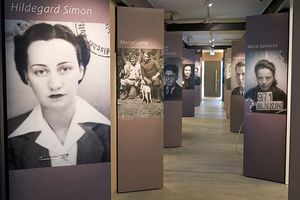
8 - 14 August 2021
The digital summer camp takes place in cooperation with Action Reconciliation Service for Peace. The focus of the summer camp is biographical work and a staged reading - developed with digital means.
During the digital summer camp, the participants will deal with the backgrounds and life stories of the former forced labourers, as well as those of the camp leaders. By studying the interviews and other sources, the participants will gain an insight into the structures of Nazi Forced Labour and into individual biographies of former actors. In this way, we want to awaken interest in historical and political processes and show that history and a critical attitude also have something to do with one's own living environment.
The biographical work is intensified through an examination of interviews with contemporary witnesses. These texts will be processed scenically in a digital framework - with all the means that Zoom makes available to us. The jointly created reading will be filmed and made into a short film as the final product of this project week.
Type: International Summer Camp (digital)
Work: Scenic reading with digital means
Group: We expect 15 participants
Camp language: English
Cost: Participation in a digital summer camp is free of charge.
Behind the scene ‐ discover industrial heritage
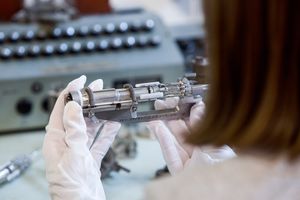
07. – 22. August 2021
In cooperation with the restorers of the Berlin University of Applied Sciences, the Berlin Centre for Industrial Culture, the International Youth Community Services (ijgd) and the ERIH Anchor Point Deutsches Technikmuseumand the Nazi Forced Labour Documentation Centre:
WorkCamp Industrial Heritage
Where: Berlin, Germany
When: 07. – 22. August 2021
Who: 15 participants aged 18‐26 years old
Searching for Traces of Forced Labour
Online Study camp
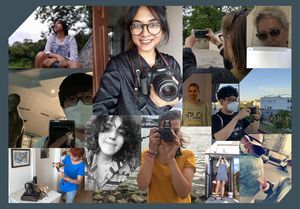
12. bis zum 23. Juli
For the second time we are organising an online study camp "Searching for Traces of Forced Labour" in cooperation with Service Civil International Germany.
The main idea of the project is to prepare a digital photo exhibition on the topic of Nazi forced labour and modern forms of free and unfree labour.
You will be invited to search for traces of forced labour in your home country and to document the results with the camera.
No prior knowledge in photography is necessary. You will get an introduction by a professional photographer.
We'll meet online (Mon-Fr) between 12-23 of July, Mon-Fr, for max. 3 hours a day 10-13 CET.
You can read more about the project here
You can see the exhibition from last year's study camp here
To register, please contact your local SCI branch or Tanja Vaitulevich at vaitulevich(at)topographie.de.
International Museum Day
16 May 2021
For this year's International Museum Day, we are offering digital workshops on the topic. Should the Berlin museums be able to open unexpectedly, you will also find the analogue offers here:
11:00 - 12:30 Workshop: Nazi Forced Labor - An Introduction to the Topic
The workshop introduces the historical site of the Nazi Forced Labor Documentation Center. An interactive research section provides insight into the many aspects of forced labour under National Socialism.
14:00 - 16:00 Workshop: (In)visible History? Nazi Forced Labor in Company Histories
During the Second World War, Germany deported millions of people to forced labour. In this interactive workshop we will look at the history of forced labour under National Socialism. Which companies benefited from it and how do they deal with this history today?
2020
Searching for Traces of Forced Labour
Online Studiencamp
In August 2020, the first digital study camp "Searching for Traces of Forced Labour" took place at the International Youth Meeting Centre in cooperation with Service Civil International Germany.
Twelve participants from Bangladesh, China, Germany, Italy, Mexico, Sebien, South Korea, Spain, Turkey and Ukraine went in search of traces in their home countries: of forced labour in the Second World War, but also of today's forms of forced labour.
Within two weeks, they created a digital exhibition presenting their stories and photographs.
Symposium: What is fair work?
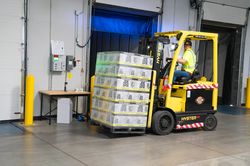
12 August 2020
Challenges in the labour market for immigrants today, Exploitative working conditions in the past.
Due to the Corona pandemic, the Fair Work Symposium on 28.04.2020 (World Day for Safety and Health at Work) has been cancelled. In compliance with the distance and hygiene regulations, we now want to make up for the event in alternative premises and exchange views on exploitative working conditions in the past and present. The symposium will focus on the situation of immigrant people in the Berlin labour market.
9:00 am: Arrival
Köpenick City Hall, Council Chamber (Room 201), Alt-Köpenick 21, 12555 Berlin
9:30 am:
Tension between fair work vs. fast job entry Challenges and obstacles to placement and counselling.
In the first part, we will have short inputs on placement pressure, criteria for placement in fair work and consequences of overwork in the workplace. We will then discuss the topics together in small groups. Among others, expert colleagues from the following projects will be available for an exchange: DGB project FairMobility, Berlin Advice Centre for Migration and Good Work BEMA, Bridge - Berlin Network for the Right to Stay, Work for Refugees (all requested).
12:00 p.m.: independent lunch in the Old Town and trip to the Nazi Forced Labor Documentation Center
13:00 Guided tour: Working conditions in Nazi Forced Labor
Nazi Forced Labor Documentation Center, Barrack 2, Britzer Str. 5, 12439 Berlin
In the second part, a guided tour of the Nazi Forced Labor Documentation Center will discuss the topics of (forced) recruitment, living and working conditions of forced labourers and the role of the labour administrations.
The event is especially aimed at: Counselling centres, job mediators, job coaches, social workers, persons accompanying people entering the labour market and all other interested individuals who support immigrants in labour issues.
The event is recognised as educational leave.
Please remember to bring a mouth-nose protection, especially for the public transport and the stay in the barracks of the Nazi Forced Labor Documentation Center.
Registration: christine.herm@ba-tk.berlin.de
The event is a cooperation of the Nazi Forced Labor Documentation Center, DIALOG Integrationsgzentrum, Projekt zur Arbeitsmarktintegration (abw gGmbH), the District Office Treptow-Köpenick, Büro Integration and InteraXion, Welcome Office and Housing Counselling for People with Migration and Refugee Experience in Treptow-Köpenick (offensiv'91 e.V.).
How political is sport?
Puzzle Tour
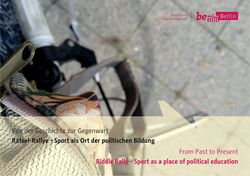
11 July 2020 | 2-6 pm
We invite you to join us on Saturday, 11 July between 2pm and 6pm to visit different stations in Treptow-Köpenick on the political importance of sport.
The stations are expected to be:
- Nazi Forced Labor Documentation Center in Niederschöneweide.
- Mellowpark in Oberschöneweide
- Stadion an der Alten Försterei (1st FC Union) in Oberschöneweide
- Airfield in Johannisthal-Adlershof
- Water Sports Museum in Grünau
- Köpenicker Football Club in the Allende district
You can take part by bike, on foot or by public transport. You can start at any station and also pick your own route. For the riddles, you will be given a routing slip with a small crossword puzzle. We will raffle small prizes among all participants who can guess the solution word. Participation at all stations is not necessary.
However, in view of the current situation surrounding Covid-19, we ask you to participate only in small groups of no more than five people. You will drive or walk from station to station and solve puzzles there. Please also bring mouth-nose masks.
The event is part of the event series "From History to the Present - Places of Historical and Political Education in Treptow-Köpenick" in cooperation with the Centre for Democracy Treptow-Köpenick, Welcome Office Interaxion and the District Office Treptow-Köpenick.
(In)visible history?
Nazi Forced Labor in Corporate Histories
18 June 2020 | 5 pm
Online Seminar
During the Second World War, Germany deported millions of people into forced labour. We will look at the history of forced labour under National Socialism. Which companies benefited from it and how do they deal with this history today?
In view of the Corona pandemic, the workshop will be held online as a webinar.
It is a replacement date for the event of the same name in the series "From History to the Present. Places of historical and political education in Treptow-Köpenick" in cooperation with the Centre for Democracy, the Partnership for Democracy Treptow-Köpenick, the Welcome Office interaxion (offesniv'91) and the District Office Treptow-Köpenick.
de.
(His)STORY IN THE EAR, IMAGES IN THE HEAD
Podcast workshop on the topic of forced labour under National Socialism
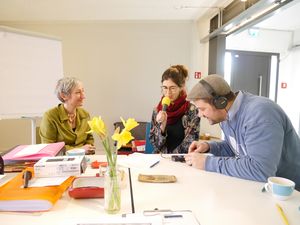
How do I produce a podcast? How do I make history(s) audible? Together with the radio reporter Florian Jacobsen, we want to explore these questions at the historical site of a former forced labour camp and record our own podcasts.
2019
Theme day: What is fair work?
Experiences of migrants and refugees in the context of human rights
Tuesday, 10 December 2019, 15:00 - 20:00
We want to talk about the topic of fair work in two parts. The first part is about work during the Second World War. Following this, human rights came into being in 1948. Nevertheless, people have to fight for them again and again. This also applies to rights on the job. Especially for immigrants, there are often problems. That is why the second part deals with the current working conditions of people with migration and refugee experience.
With this theme day, we would like to address in particular: Migrants and refugees, volunteers and supporters, guardians, vocational students and all other interested individuals.
If you need a translation, please send an email to: interaxion@offensiv91.de
3-6 p.m. Part 1
The first part is about work during the Second World War. This was followed by human rights in 1948. Nevertheless, people have to fight for them again and again. This also applies to rights on the job. Especially for immigrants there are often problems in the job.
6-8 p.m. Part 2
People have to fight for their rights again and again. Especially for immigrants, there are often problems on the job. This is why the second part of the theme day deals with the current working conditions of people with migration and refugee experience.
An event in cooperation with:
Treptow-Köpenick District Office
Welcome office / interaxion
Migration counselling for adults
DIALOG - Integration Centre for Migrants; abw - Non-Profit Society for Work, Education and Housing mbH
Sozialfabrik
Fair/ Fair Mobility
Free movement of workers social, fair and active
BEMA
Counselling Centre Migration and Good Work
Photography workshop with Mark Mühlhaus
Learning to photograph, understanding history, telling stories with pictures
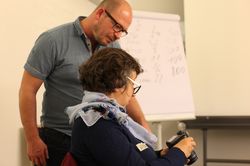
5 - 27 October 2019
The workshop offers the opportunity to learn how to use a digital SLR camera based on traces of Nazi Forced Labor.
The grounds of the Nazi Forced Labor Documentation Center as well as the urban surroundings are the focus of the photographic search for traces. The participants practise creating pictures and searching for their own motifs in this special place. The aim is to develop their own photographic history through the examination of the content.
The photographer Mark Mühlhaus from attenzione photographers (www.attenzione-photo.com) has dealt intensively with the topic of Nazi commemoration politics. He has published his findings in the illustrated book "Begegnungen" (2005) and the photo exhibition "Im Schatten von Auschwitz" (2017/2018), among others.
Seminar times:
Friday, 25 October 2019, 1-6 p.m.
Saturday, 26 October 2019, 10 a.m.-6 p.m.
Sunday, 27 October 2019, 10 a.m.-4 p.m.
The workshop is limited to 12 people, minimum age is 18. Cameras will be provided free of charge upon request.
Closing event of the International Photographic Summer Camp
Exhibition of the works
25 July | 7 pm
From 12 to 26 July, our international search for traces will take place with participants from Belarus, Turkey, Urkaine, the Czech Republic, Russia, Georgia and Germany. The participants will not only learn how to use professional photographic equipment and go on a photographic search for traces in Berlin, they will also meet Vera Friedländer, a Berlin contemporary witness, for a conversation. We are very happy that Ms Friedländer will take the time.
Racism against Sinti and Roma, past and present
Workshop
27 May 2019 | 5 pm
Cooperation event with the Bildungsforum gegen Antiziganismus and Amaro Foro e.V. as part of the programme "From History to the Present | Places of Historical and Political Education Work in Treptow-Köpenick".
At the historical site of a former forced labour camp, the workshop first deals with the situation of Sinti and Roma at the time of National Socialism. Members of the minority were systematically persecuted, exploited and murdered in Germany and Europe. According to estimates, 500,000 people fell victim to the genocide. The survivors and their relatives were also confronted with racism after the Second World War. The second part of the workshop will focus on the situation of different groups of Roma and Sinti in Germany today. The focus will be on political and media debates as well as structural disadvantages and experiences of racism in everyday life.
